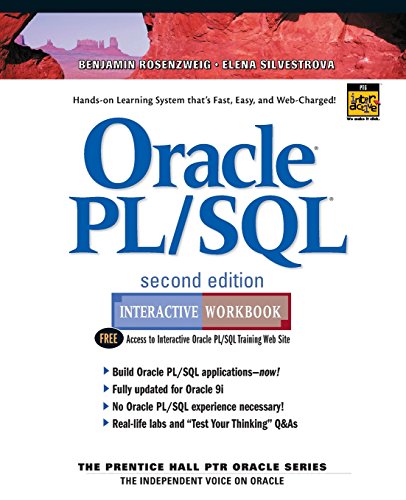Oracle Pl/SQL: Interactive Workbook - Softcover

Synopsis
Explains how to develop applications using Oracle PL/SQL, covering such concepts as iterative and conditional control, scoping, anchored datatypes, security, tables, and cursors.
"synopsis" may belong to another edition of this title.
About the Author
BENJAMIN ROSENZWEIG is an Integration Specialist at IQ Financial Systems. Prior to that he was a principal consultant for more than 3 years at Oracle Corporation in the Custom Development Department. His computer experience ranges from creating an electronic Tibetan-English Dictionary in Kathmandu, Nepal, to supporting presentations centers at Goldman Sachs and managing a trading system at TIAA-CREF. His previous Prentice Hall PTR publications include Oracle PL/SQL: The Complete Video Course and Oracle Forms Developer: The Complete Video Course.
ELENA SILVESTROVA, a senior software engineer for a prominent New York brokerage firm and securities dealer, has taught relational database programming in Columbia University's CTA program during the past four years. She studied analysis and design at Columbia University and applied mathematics at Baku State University in Azerbaijan.
From the Back Cover
- Build Oracle PL/SQL applications—now.
- Fully updated for Oracle 9i
- No Oracle PL/SQL experience necessary.
- Real-life labs and "Test Your Thinking" Q&As
Start developing applications with Oracle PL/SQL—fast. This integrated book-and-Web learning solution teaches all the Oracle PL/SQL skills you need, hands on, through real-world labs, exercises, projects, and a complete Web-based training site. Completely updated for Oracle 9i, it covers all the fundamentals—and a whole lot more. Master PL/SQL syntax, iterative and conditional control, scoping, anchored datatypes, cursors, triggers, security, tables, and packaging—plus powerful new techniques for working with exceptions, cursors, collections, and records. Your free Web-based training module includes a Virtual Study Lounge where you can interact with other learners, work on new projects, and get updates.
Totally integrated with a FREE, state-of-the-art Oracle 9i learning Web site.
Every Prentice Hall Oracle Interactive Workbook is fully integrated with its own exclusive Web site, giving you all this and more:
- "Test Your Thinking" project solutions and detailed explanations
- Additional self-review exercises with instant feedback and explanations
- An exclusive Virtual Study Lounge where you can interact with other students.
Just the facts. No endless, boring discussions here. You'll learn hands on through practical exercises, self-review questions, and real-world answers. Exclusive "Test Your Thinking" projects guarantee you'll go beyond rote knowledge to really master the subject. It's an integrated learning system that's proven to work.
Dozens of exercises cover the real-world tasks that matter most.
Hundreds of self-review questions and answers make sure you understand.
"About this title" may belong to another edition of this title.
US$ 3.75 shipping within U.S.A.
Destination, rates & speedsSearch results for Oracle Pl/SQL: Interactive Workbook
Oracle Pl/SQL: Interactive Workbook
Seller: HPB-Red, Dallas, TX, U.S.A.
paperback. Condition: Acceptable. Connecting readers with great books since 1972. Used textbooks may not include companion materials such as access codes, etc. May have condition issues including wear and notes/highlighting. We ship orders daily and Customer Service is our top priority! Seller Inventory # S_440054084
Quantity: 1 available
Oracle PL/SQL Interactive Workbook
Seller: ThriftBooks-Atlanta, AUSTELL, GA, U.S.A.
Paperback. Condition: Good. No Jacket. Pages can have notes/highlighting. Spine may show signs of wear. ~ ThriftBooks: Read More, Spend Less 2.18. Seller Inventory # G0130473200I3N00
Quantity: 1 available
Oracle PL/SQL: Interactive Workbook (Prentice Hall PTR Oracle)
Seller: AwesomeBooks, Wallingford, United Kingdom
Paperback. Condition: Very Good. Oracle PL/SQL: Interactive Workbook (Prentice Hall PTR Oracle) This book is in very good condition and will be shipped within 24 hours of ordering. The cover may have some limited signs of wear but the pages are clean, intact and the spine remains undamaged. This book has clearly been well maintained and looked after thus far. Money back guarantee if you are not satisfied. See all our books here, order more than 1 book and get discounted shipping. Seller Inventory # 7719-9780130473202
Quantity: 1 available
Oracle PL/SQL: Interactive Workbook (Prentice Hall PTR Oracle)
Seller: Bahamut Media, Reading, United Kingdom
Paperback. Condition: Very Good. This book is in very good condition and will be shipped within 24 hours of ordering. The cover may have some limited signs of wear but the pages are clean, intact and the spine remains undamaged. This book has clearly been well maintained and looked after thus far. Money back guarantee if you are not satisfied. See all our books here, order more than 1 book and get discounted shipping. Seller Inventory # 6545-9780130473202
Quantity: 1 available

